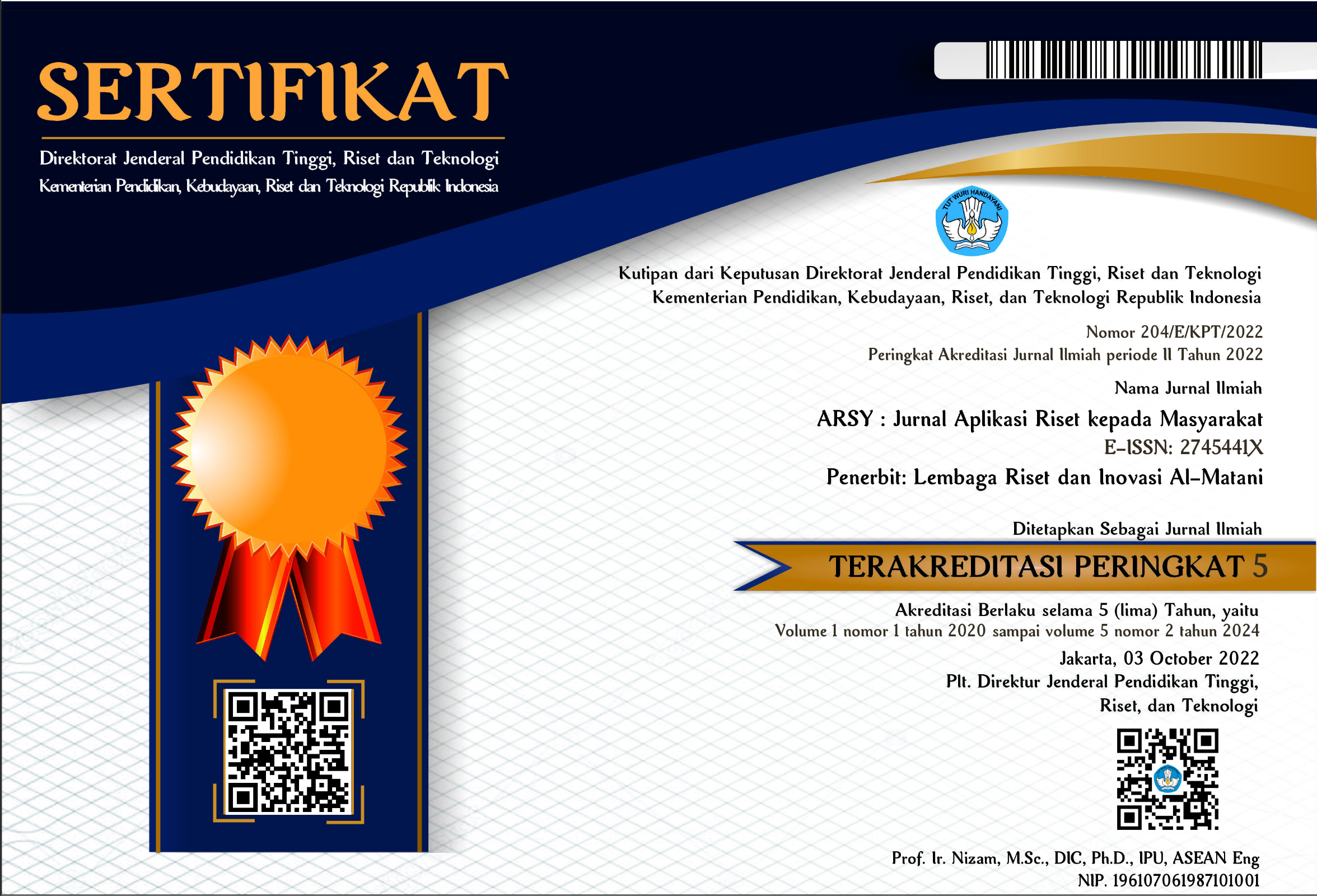Strategi Pengembangan Desa Wisata Alam Berbasis Digital Tourism Di Desa Bandur Picak, Kecamatan Koto Kampar Hulu, Riau
DOI:
https://doi.org/10.55583/arsy.v6i3.1709Keywords:
Strategi, Digital Tourisme, Pengembangan, Desa WisataAbstract
Kegiatan Pengabdian kepada Masyarakat (PkM) ini dilaksanakan di Desa Bandur Picak, Kecamatan Koto Kampar Hulu, Kab. Kampar Riau. Beberapa keindahan dan kesatuan yang bisa dinikmati di lokasi Objek Wisata Air Sungai Merah dengan panjang lintasan tiga kilometer dan jarak tempuh tiga puluh menit. Air terjun Sungai Merah selain jernih dan sejuk juga dijamin bersih karena tidak ada aktivitas pembuangan limbah di bagian hulu sungai. Di sepanjang lintasan sungai, pengunjung bisa menikmati pemandangan alam, diantaranya berbagai bentuk bebatuan di dinding yang berada di sepanjang sungai. Namun ada beberapa permasalahan seperti jumlah kunjungan wisatawan disuatu kawasan wisata dapat disebabkan oleh beberapa faktor, salah satunya adalah kurangnya promosi dan pembangunan infrastruktur pariwisata yang belum maksimal. Untuk mengatasi permsalahan tersebut, Tim PkM Universitas Islam Riau memberikan solusi dengan strategi pengembangan objek wisata alam berbasis Digital Tourism. Kegitan ini menggunakan metode dengan berbagai tahapan seperti tahapan sosialisasi, penyuluhan, pelatihan, pelaksanaan luaran dan tahap monitoring dan evaluasi.
References
Barbu, F.-S., Sanda, G., Rusu, C.-M., & Balint, P.-G. (2024). The Impact of Social Networks on the Choice of Tourist Destinations. Proceedings of the International Conference on Business Excellence, 18(1), 2327–2343. https://doi.org/Platforms like Instagram, Facebook and TikTok allow travellers to share their experiences and find inspiration for new destinations.
Chakravarty, S. (2024). E-Tourism’s Trends and Their Effects on Indian Tourism Industry. In Future Tourism Trends Volume 2 (pp. 97–111). Emerald Publishing Limited. https://doi.org/10.1108/978-1-83753-970-320241006
Chen, Z. (2025). Beyond boundaries: exploring the Metaverse in tourism. International Journal of Contemporary Hospitality Management, 37(4), 1257–1275. https://doi.org/10.1108/IJCHM-06-2023-0900
Cheng, W., Tian, R., & Chiu, D. K. W. (2024). Travel vlogs influencing tourist decisions: information preferences and gender differences. Aslib Journal of Information Management, 76(1), 86–103. https://doi.org/10.1108/AJIM-05-2022-0261
Chon, K. K. S., & Hao, F. (2025). Technological evolution in tourism: a Horizon 2050 perspective. Tourism Review, 80(1), 313–325. https://doi.org/10.1108/TR-10-2023-0753
Cramariuc, O., & Nastase, C. E. (2025). The Interplay Between Information and Communications Technology Solutions Development and Millennial Visitors’ Behavior in Refining Smart Tourism Destinations. In International Conference on Modern Trends in Business Hospitality and Tourism (pp. 323–339). Springer. https://doi.org/10.1007/978-3-031-75883-6_20
Doğan, S., & Niyet, İ. Z. (2024). Artificial Intelligence (AI) in Tourism. In Future Tourism Trends Volume 2 (pp. 3–21). Emerald Publishing Limited. https://doi.org/10.1108/978-1-83753-970-320241001
Ghaderi, Z., Béal, L., Zaman, M., Hall, C. M., & Rather, R. A. (2024). How does sharing travel experiences on social media improve social and personal ties? Current Issues in Tourism, 27(21), 3478–3494. https://doi.org/10.1080/13683500.2023.2266101
Hernández Sánchez, N., & Oskam, J. (2025). A “new tourism cycle” on the Canary Islands: scenarios for digital transformation and resilience of small and medium tourism enterprises. Journal of Tourism Futures, 11(1), 6–22.
Keelson, S. A., Bruce, E., Egala, S. B., Amoah, J., & Bashiru Jibril, A. (2024). Driving forces of social media and its impact on tourists’ destination decisions: a uses and gratification theory. Cogent Social Sciences, 10(1), 2318878. https://doi.org/10.1080/23311886.2024.2318878
Xia, L., Baghaie, S., & Mohammad Sajadi, S. (2024). The digital economy: Challenges and opportunities in the new era of technology and electronic communications. Ain Shams Engineering Journal, 15(2), 102411. https://doi.org/10.1016/j.asej.2023.102411
Xu, J., Shi, P. H., & Chen, X. (2025). Exploring digital innovation in smart tourism destinations: insights from 31 premier tourist cities in digital China. Tourism Review, 80(3), 681–709. https://doi.org/10.1108/TR-07-2023-0468
Zindi, B., Ndhlovu, E., & Mhlanga, D. (2024). The Digital Evolution of Global Tourism and the Practical Lessons for African Small Businesses. In Sustainable Finance and Business in Sub-Saharan Africa (pp. 447–471). Springer Nature Switzerland. https://doi.org/10.1007/978-3-031-74050-3_22
Barbu, F.-S., Sanda, G., Rusu, C.-M., & Balint, P.-G. (2024). The Impact of Social Networks on the Choice of Tourist Destinations. Proceedings of the International Conference on Business Excellence, 18(1), 2327–2343. https://doi.org/Platforms like Instagram, Facebook and TikTok allow travellers to share their experiences and find inspiration for new destinations.
Chakravarty, S. (2024). E-Tourism’s Trends and Their Effects on Indian Tourism Industry. In Future Tourism Trends Volume 2 (pp. 97–111). Emerald Publishing Limited. https://doi.org/10.1108/978-1-83753-970-320241006
Chen, Z. (2025). Beyond boundaries: exploring the Metaverse in tourism. International Journal of Contemporary Hospitality Management, 37(4), 1257–1275. https://doi.org/10.1108/IJCHM-06-2023-0900
Cheng, W., Tian, R., & Chiu, D. K. W. (2024). Travel vlogs influencing tourist decisions: information preferences and gender differences. Aslib Journal of Information Management, 76(1), 86–103. https://doi.org/10.1108/AJIM-05-2022-0261
Chon, K. K. S., & Hao, F. (2025). Technological evolution in tourism: a Horizon 2050 perspective. Tourism Review, 80(1), 313–325. https://doi.org/10.1108/TR-10-2023-0753
Cramariuc, O., & Nastase, C. E. (2025). The Interplay Between Information and Communications Technology Solutions Development and Millennial Visitors’ Behavior in Refining Smart Tourism Destinations. In International Conference on Modern Trends in Business Hospitality and Tourism (pp. 323–339). Springer. https://doi.org/10.1007/978-3-031-75883-6_20
Doğan, S., & Niyet, İ. Z. (2024). Artificial Intelligence (AI) in Tourism. In Future Tourism Trends Volume 2 (pp. 3–21). Emerald Publishing Limited. https://doi.org/10.1108/978-1-83753-970-320241001
Ghaderi, Z., Béal, L., Zaman, M., Hall, C. M., & Rather, R. A. (2024). How does sharing travel experiences on social media improve social and personal ties? Current Issues in Tourism, 27(21), 3478–3494. https://doi.org/10.1080/13683500.2023.2266101
Hernández Sánchez, N., & Oskam, J. (2025). A “new tourism cycle” on the Canary Islands: scenarios for digital transformation and resilience of small and medium tourism enterprises. Journal of Tourism Futures, 11(1), 6–22.
Keelson, S. A., Bruce, E., Egala, S. B., Amoah, J., & Bashiru Jibril, A. (2024). Driving forces of social media and its impact on tourists’ destination decisions: a uses and gratification theory. Cogent Social Sciences, 10(1), 2318878. https://doi.org/10.1080/23311886.2024.2318878
Xia, L., Baghaie, S., & Mohammad Sajadi, S. (2024). The digital economy: Challenges and opportunities in the new era of technology and electronic communications. Ain Shams Engineering Journal, 15(2), 102411. https://doi.org/10.1016/j.asej.2023.102411
Xu, J., Shi, P. H., & Chen, X. (2025). Exploring digital innovation in smart tourism destinations: insights from 31 premier tourist cities in digital China. Tourism Review, 80(3), 681–709. https://doi.org/10.1108/TR-07-2023-0468
Zindi, B., Ndhlovu, E., & Mhlanga, D. (2024). The Digital Evolution of Global Tourism and the Practical Lessons for African Small Businesses. In Sustainable Finance and Business in Sub-Saharan Africa (pp. 447–471). Springer Nature Switzerland. https://doi.org/10.1007/978-3-031-74050-3_22








